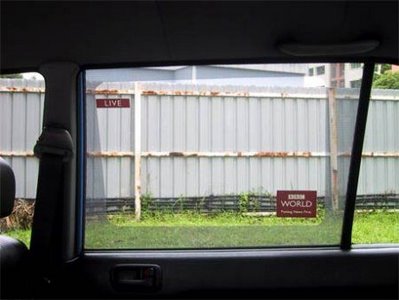Tuesday, November 07, 2006 by
David Claude
, under
adkrispies,
ads,
advertising,
agency,
BBC,
business,
communication,
news
Stickers remindful of "live report" television screen captions have been sticked to taxi windows, remind everyone that BBC covers the world as it happens. That's genius. Credits please? (Thanks, Marketing Alternatif!)

|


Wednesday, September 27, 2006 by
David Claude
, under
adkrispies,
ads,
advertising,
altea,
atlético,
bubble,
commercials,
communication,
respect your personal space,
seat,
tv
I absolutely love the idea behind this commercial. Your. Personal. Space. Think about it for a moment. A car ad that features a lightly enhanced human reality. No tacky family/stuff-big-or-weird-things-in-the-trunk concepts, no over-exaggerated special effects that don't serve the story, no flashy music. Just a well executed concept, great story and great direction (by Stylewar). Ahhh. Refreshing.
I salute the people at Atlético International Advertising, responsible for this novel piece of genius. (Thanks, Llamame Lola!)
|


Monday, September 25, 2006 by
David Claude
, under
adkrispies,
commercials,
communication,
editorial,
poll,
tv,
viral marketing,
web,
wom,
word of mouth,
world wide web
There is a running debate in the ad industry (agencies and announcers alike) on whether ad agencies should allow the posting of ads that were initially made for TV only, on Internet sites. For example, yours truly, AdKrispies: I'm often posting TV ads of various announcers for your enjoyment, as (among other blogs of my type) I know the general public and agencies alike appreciate the artistic and communicational intelligences of these ads, and thus appreciate them being shared publicly.
But as I'm doing this, the following also happens:
- I become a new media channel for these ads. Let's say I'm displaying a recently-produced TV ad for a fictive company, Moca-Cola, then Moca-Cola gets some free advertising on a media channel they didn't pay for.
- This causes many media placement obligations to be infringed, among others this one: the agencies usually negociate actors appearing in ads depending on complex calculations, but basically withstanding reach (how many people see the ad) and frequency (how many times they see it). While you cannot control the internet posting of TV ads, there is no way to say how many additional times an ad will be seen, other than its original TV use. This means that the actors appearing in the ads you view on places like here are not being paid as per contract definition.
- The fact that Moca-Cola gets a free additional media channel means good news for their product placement and brand, yet somewhere, ad agencies lose money (oh I know, boo-hoo-hoo) for work they should normally be paid to do - media placement. But of course, they shut up because the client is happy.
So, as Moca-Cola's commercial is being featured on web sites, the following happens: instead of going even with their 1 million$ total placement/production costs on canadian TV...
- They now get maybe twice or three times much viewers than their originally intended TV viewership,
- They get viewed in countries they never expected to reach,
- They pay peanuts to the production house, actors and agencies for their now worldwide success,
- Are winning over incredible word-of-mouth for their new product/ad.
So this brings the interesting question(s):
Do you think viral video will eventually kill media placement in television?
As announcers, should we be happy that viral video is a phenomenon that actually helps propel our work forward, or should we find a way to control internet propagation to the keep cost/revenue ratio balanced?
Please post your opinions and comments freely. In any language you like.
|



